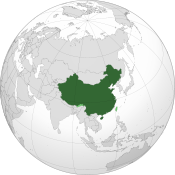Chinese dissident goes on trial for subversion
Wednesday, December 23, 2009
Image: Voice of America staff.
The trial of Chinese dissident Liu Xiaobo started today in Beijing on the grounds of "inciting subversion of state power". The United States, European Union and rights groups have called the trial politically motivated and are calling for his release. In prison since 2008 after his arrest for co-writing about political reform, the 53-year-old faces fifteen years in prison if convicted.
Foreign diplomats from more than a dozen countries and supporters were forbidden entry by police posted outside the court; even Liu's wife, Liu Xia, was not permitted to attend, although her brother and the dissendent's lawyer Shang Baojun, who expects a verdict by Friday, were allowed inside. China has called international criticism "unacceptable" and ignored calls for Liu's release.
Rights group Human Rights Watch described the trial as "a travesty of justice". Its director for Asia, Sophie Richardson said that "[t]he only purpose of this trial is to dress up naked political repression in the trappings of legal proceedings […] Liu's crimes are non-existent, yet his fate has been pre-determined."
Locals have turned up to voice their support, despite police presence. "Long live democracy, long live Liu Xiaobo!" cried Song Zaimin. "I don't know him and I don't want to know him but I just support his heroic behaviour. We must stand up for our future."
The document co-written by Liu, known as Charter 08, calls for democratic change and more freedom. Signed by over 10,000 people, the petition states: "We hope that our fellow citizens who feel a similar sense of crisis, responsibility, and mission, whether they are inside the government or not, and regardless of their social status, will set aside small differences to embrace the broad goals of this citizens' movement."
| Liu's crimes are non-existent, yet his fate has been pre-determined. | ||
—Human Rights Watch | ||
One such signatory, human rights lawyer Teng Biao defended the charter. "I have the right to express my opinions about society and politics," he said, adding that "[i]f Liu Xiaobo is sentenced, then we should also assume the same crime, and we should bear the same legal responsibility."
The charge of inciting subversion is commonly used to repress critics of the country's Communist Party, according to human rights groups.
Sources
- "China dissident Liu Xiaobo tried for subversion" — BBC News Online, December 23, 2009
- Agence France-Presse. "Leading dissident goes on trial for 'subversion'" — France 24, December 23, 2009

